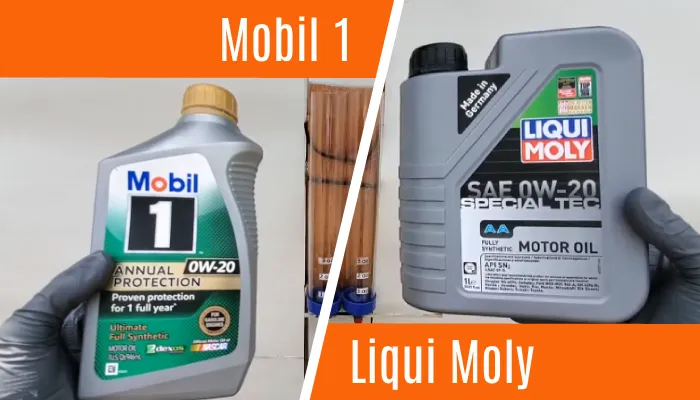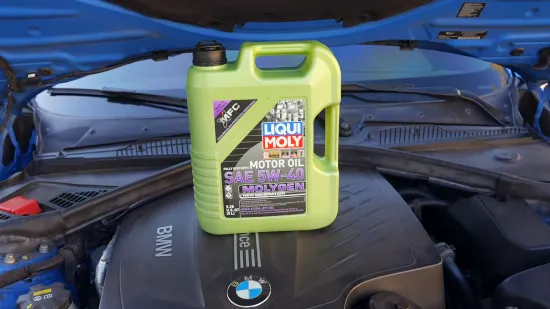Physical Address
304 North Cardinal St.
Dorchester Center, MA 02124
Physical Address
304 North Cardinal St.
Dorchester Center, MA 02124

A vehicle’s engine oil can have a significant impact on its performance and longevity, so selecting the right one is important. Among the many available brands, Mobil 1 and Liqui Moly are two well-known contenders, each with unique characteristics and benefits.
Mobil 1 typically has a higher viscosity, offering excellent engine protection but potentially causing issues in cold weather starts. In contrast, Liqui Moly has a lower viscosity, reducing engine wear over time and improving cold-weather performance.
Here, we will dive into the differences between Mobil 1 and Liqui Moly engine oils. The analysis includes factors like origin, temperature control, viscosity, additives, compatibility, service intervals, etc. Strap in as we uncover the truth about these two powerhouses.

When comparing Mobil 1 and Liqui Moly engine oils, you will find some distinct differences in each formulation.
Considering the countries where Mobil 1 and Liqui Moly engine oil are produced can help explain their origins and manufacturing differences.
Mobil 1 is manufactured in the United States, known for its budget-friendly options. However, Liqui Moly is produced exclusively in Germany, renowned for its superior quality and adherence to vehicle manufacturing standards.
Mobil 1 is known for its resistance to oil breakdown, making it an excellent choice for maintaining performance in various temperature conditions. With Mobil 1, you’re assured of rapid oil delivery and proper lubrication, even in extreme cold or scorching heat.
On the other hand, Liqui Moly excels in temperature control, offering a broader range from -40°C to +280°C. This makes it ideal for vehicles operating in extreme conditions, where maintaining a stable temperature is crucial.
Continuing from the previous subtopic, you can compare the oil composition and base stocks of Mobil 1 and Liqui Moly engine oil for vehicles.
Mobil 1 is formulated with a higher concentration of antioxidants and friction modifiers. These additives help to reduce oil oxidation, extend the oil’s lifespan, and minimize friction on engine components, leading to improved fuel efficiency and performance.
In contrast, Liqui Moly engine oil contains a higher concentration of detergents and dispersants. These additives enhance engine cleanliness by preventing the formation of deposits, especially in older engines. The detergents work to remove unwanted contaminants, ensuring optimal engine performance and protection.
Mobil 1 is suitable for modern engines with lower viscosity and fewer additives. Meanwhile, Liqui Moly is better suited for older engines with higher viscosity and more additives.
It means that if you’re looking for engine oil to use in a newer car, Mobil 1 is likely the better choice. Alternatively, Liqui Moly is more suitable for older engines. It should be noted, however, that both oils are compatible with most vehicle makes and models.
Additionally, Liqui Moly and Mobil 1 engine oils differ in their compatibility with a variety of vehicle types and brands.
Mobil 1 is designed to be suitable for a wide range of vehicles, including automobiles, SUVs, passenger cars, and light vans. This makes it a versatile choice for different types of drivers.
On the other hand, Liqui Moly’s compatibility is more specific and extends to certain vehicle brands, such as BMW, Jeeps, and certain motorcycles. This can be advantageous if you own one of the supported vehicle types.
Mobil 1 offers a service coverage of up to 10,000 miles, which means that you can go longer between oil changes compared to other oils. This extended service period is made possible by Mobil 1’s advanced formulation, which provides excellent protection and performance for your engine.
On the other hand, Liqui Moly offers a more flexible oil change interval, ranging from 5,000 to 10,000 miles. This allows you to customize the maintenance schedule based on your driving habits and conditions.
Known for its ability to improve fuel economy and reduce emissions, Mobil 1 is a more environmentally friendly choice. By reducing friction and providing better lubrication, Mobil 1 improves engine efficiency and reduces fuel consumption.
This not only saves you money at the pump but also contributes to a cleaner environment by reducing greenhouse gas emissions.
In contrast, Liqui Moly also emphasizes its efficiency in reducing emissions and promoting cleaner engine performance. It protects against frictional damage and ensures optimum performance in all weather conditions, reducing fuel consumption and emissions.
You can save money by purchasing Mobil 1 due to its affordability. It offers a good balance between price and performance, delivering reliable lubrication and protection for your engine.
Meanwhile, Liqui Moly is considered a premium choice due to its higher price. It offers superior quality and performance, ensuring optimal engine performance and longevity.
While it may come at a higher cost, Liqui Moly’s advanced additives and formulation provide enhanced protection and cleaning properties.
| Aspect | Mobil 1 | Liqui Moly |
| Origin and Manufacturing | USA | Germany |
| Temperature Control | Excellent at high and low temps | Broad temperature range, extreme conditions |
| Additives and Cleanliness | Antioxidants, friction modifiers, cleanliness | Detergents, dispersants, deposit prevention |
| Engine Compatibility | Gas and diesel engines without DPFs, 5W-30 | Gas and diesel engines, 5W-40, older engines |
| Service Period & Mileage | Typically, 10,000 miles between oil changes | Variable, 5,000 to 10,000 miles |
| Fuel Economy & Emissions | Improved fuel economy, reduced emissions | Emphasizes efficiency, reduced emissions |
| Price-to-Performance Ratio | Budget-friendly | Considered a premium choice |

Liqui Moly engine oils are formulated to meet and exceed the industry standards and specifications set by BMW, Mercedes-Benz, Porsche, and Volkswagen.
This means that Liqui Moly engine oils have been rigorously tested and proven to provide optimal performance and protection for your vehicle’s engine.
Mobil 1 motor oils work better for Mercedes-Benz vehicles. They undergo rigorous testing to ensure they meet or exceed motor oil specifications for Mercedes engines.
In fact, Mobil 1 ESP X2 0W-20 advanced full synthetic motor oil is approved against Mercedes-Benz spec 229.71. This means that Mobil 1 not only meets the high standards set by Mercedes-Benz, but it also provides enhanced protection and performance for your engine.
In your vehicle engine, you shouldn’t mix Mobil 1 and Liqui Moly oils. It’s important to understand that different brands of oil may have different formulations, additives, and viscosity ratings.
By mixing these oils, you run the risk of altering the balance of these properties, which can negatively impact the performance and protection of your engine. Each brand of oil is designed to work optimally with its own additives and specifications.
Both Liqui Moly and Mobil 1 engine oils typically require regular oil changes and adherence to the manufacturer’s recommendations for maintenance. Regular oil changes are necessary to ensure optimal engine performance and longevity.
The frequency of oil changes may vary depending on factors such as driving conditions, mileage, and the specific requirements of your vehicle.
As you can see, both Mobil 1 and Liqui Moly engine oils are excellent choices for vehicles. Some may argue that Mobil 1 is better suited to Mercedes vehicles, but both brands meet the necessary engine protection and performance specifications.
Mobil 1 offers reliable performance, fuel economy benefits, and affordability, making it a practical choice for a wide range of vehicles. Liqui Moly offers superior temperature control, engine cleanliness, as well as compatibility with certain brands of vehicles due to its German engineering.
Both oils also require regular maintenance to ensure optimal performance and longevity. Rest assured, whichever brand you choose, your vehicle will benefit from high-quality engine oil.
Last update on 2026-02-14 / Affiliate links / Images from Amazon Product Advertising API